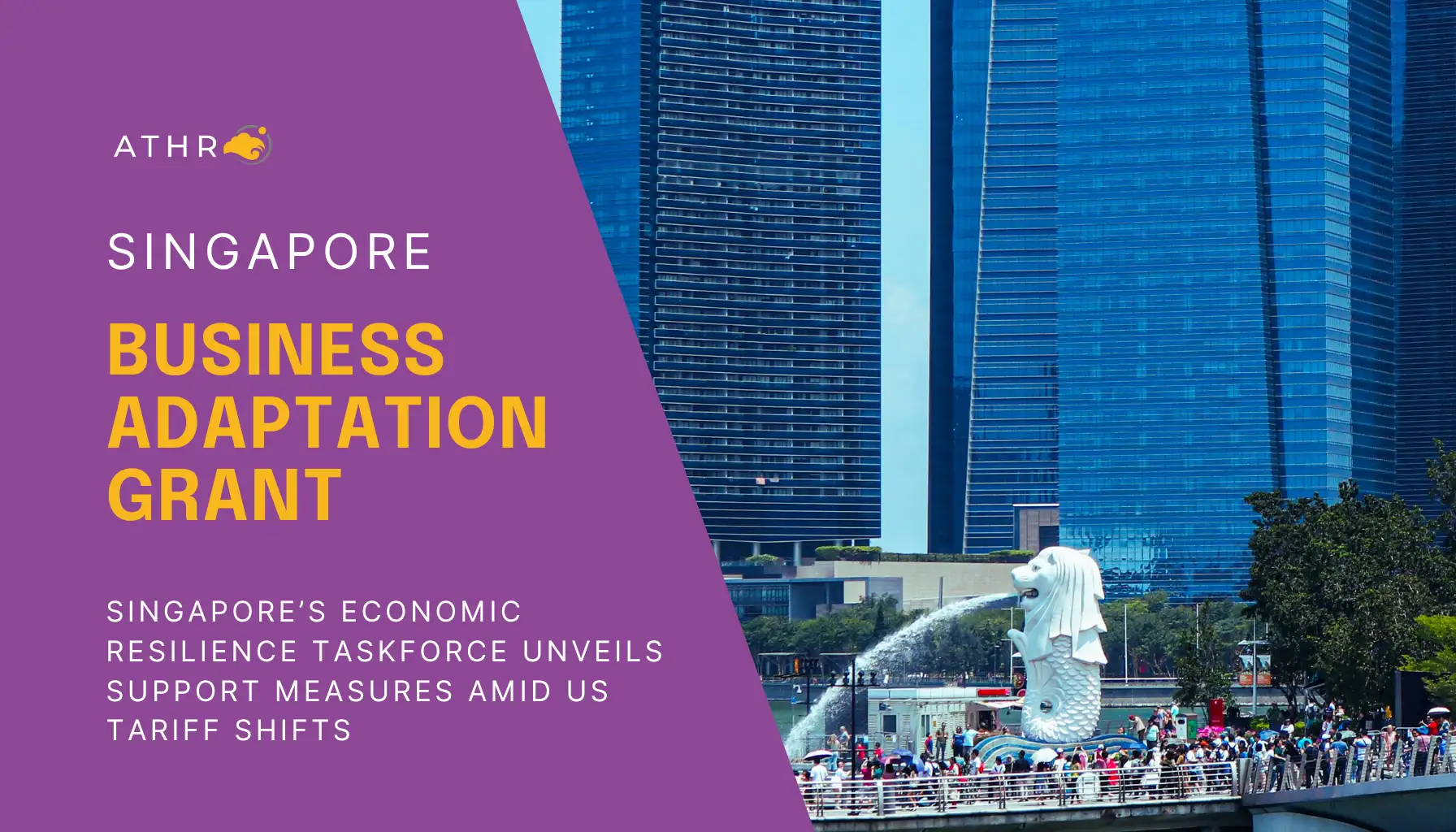


Building on our previous coverage of Singapore Economic Resilience Taskforce's(SERT) formation in April 2025, July marks a pivotal transition from planning to implementation as Deputy Prime Minister Gan Kim Yong and the taskforce deliver concrete support measures for Singapore's business community.
In this article, we analyze Singapore's latest economic resilience measures announced by SERT, including the new Business Adaptation Grant launching in October 2025 and expanded support for workers. We explore what these measures mean for businesses operating in Singapore's evolving trade landscape and how companies can leverage these new opportunities amid ongoing US tariff uncertainties.
Three months after forming the Singapore Economic Resilience Taskforce (SERT), Deputy Prime Minister Gan Kim Yong has delivered real support for companies and workers dealing with US trade tensions. At a recently held press conference, SERT announced a new Business Adaptation Grant and expanded help for workers.
This comes at a critical time. President Trump recently said he would impose a 50% tariff on copper and plans new taxes on semiconductors and drugs. Meanwhile, Singapore is moving from planning to action, turning trade challenges into business opportunities.
The upcoming business grant launches in October 2025 and will run for 2 years. Here's what businesses need to know:
Grant Details:
For Companies That Export or Have Overseas Operations:
For Manufacturing Companies (Local or Overseas):
This isn't a general handout. It's designed specifically for companies dealing with new tariffs. The grant responds to feedback from over 3,000 business leaders, workers, and graduates that SERT has spoken with since April.
The new grant works alongside existing government help rather than replacing it. Companies can potentially use multiple programs at once:
A Singapore manufacturer, for example, could use the Business Adaptation Grant for supply chain changes while also getting the Enterprise Development Grant for new technology and the Market Readiness Grant for expanding to new countries.
The government and the National Trades Union Congress - Employment and Employability Institute (NTUC-e21) are expanding career guidance services, building on the new Career Health SG program that helps Singaporeans build stronger careers. This addresses a key concern from SERT's talks with workers: people need better career planning during uncertain times.
The expanded services will help both current workers and job seekers. Instead of just finding immediate jobs, the focus is on strategic career planning that builds long-term stability.
Many companies, especially smaller ones, don't have strong HR teams to help their workers during tough times. The government is providing temporary extra funding for basic HR training. This helps companies:
Recent concerns about graduate jobs prompted Minister Tan See Leng to share encouraging data. The employment rate for 2025 graduates was 51.9% in June, up from 47.9% in the same period last year. Entry-level jobs remain steady, with about 1.64 job openings per unemployed person.
The Public Service alone has 2,400 immediate openings for fresh graduates, including engineering and software development roles. These are available through the Careers@Gov website, with a special career fair planned for August.
The SkillsFuture Jobseeker Support program has already helped 2,200 people who lost their jobs between April and June 2025. Application numbers are now stable, and more employers plan to raise wages compared to before the tariffs started.
While Singapore deals with the existing 10% universal tariff from April 2025, other Asian countries face much worse. Last week, Trump sent tariff letters to 14 countries, with six Asian economies getting hit hard starting August 1, 2025:
Singapore wasn't among the countries getting these higher tariff letters. This suggests ongoing talks with the US may be working, though Singapore still faces the universal tariffs when the current pause ends.
The letters to other Asian countries show Trump's frustration with slow negotiations and target Asia's trade connections with China, especially goods shipped through multiple countries to avoid tariffs.
Singapore's economic forecast reflects these trade challenges. The trade ministry cut the 2025 GDP growth forecast from 1-3% to 0-2% after the US announced tariffs. DPM Gan warned that while the economy held up well in early 2025, growth will likely slow in the coming months.
The biggest concern is Singapore's key export sectors. Semiconductors, electronics, and pharmaceutical goods make up about 40% of Singapore's exports to the US. These face potential additional tariffs beyond the baseline rates, which could significantly impact the economy.
Singapore is working on multiple fronts to reduce tariff impact. DPM Gan said upcoming US discussions will focus first on pharmaceutical tariff relief, then semiconductor talks later. This step-by-step approach prioritizes sectors based on their vulnerability.
Unlike neighboring countries facing much higher tariff rates, Singapore's absence from the latest tariff letters suggests diplomatic efforts may be paying off. However, this advantage isn't guaranteed - Singapore still faces resumed universal tariffs and possible inclusion in future sector-specific tariffs.
The challenge grows with Trump's warnings against transshipment (routing goods through other countries to avoid tariffs). Companies must ensure their supply chains are transparent and compliant.
Last week's announcements create clear opportunities for Singapore companies:
Grant Preparation: Start assessing eligibility for the October Business Adaptation Grant. Gather financial records and document how tariffs affect your business.
Supply Chain Review: Identify vulnerabilities and opportunities for diversification. The grant can help fund professional advice in this area.
Workforce Planning: Use expanded career guidance and HR certification support to strengthen your team during uncertain times.
Smart companies will see these measures as more than crisis relief. The government support enables fundamental business improvements that might otherwise take years:
Companies should integrate these opportunities into broader risk planning. Tariff adaptation is just one part of building business resilience. Organizations that use current support to build general adaptive capacity will handle future challenges better.
DPM Gan emphasized the government's commitment to ongoing monitoring and business engagement. Singapore will implement additional measures if the economic situation worsens unexpectedly, showing the government's flexible approach to crisis management.
This commitment reflects lessons from previous economic disruptions. Instead of static support packages, Singapore is building response systems that can evolve with changing circumstances.
These new measures do more than respond to crisis - they implement Singapore's long-term vision of economic resilience through diversification, innovation, and adaptive capacity. By supporting business transformation during external pressure, Singapore accelerates structural changes that strengthen future competitiveness.
The focus on workforce development alongside business support shows understanding that sustainable economic resilience requires human capital development, not just financial help.
The measures announced create immediate opportunities for Singapore businesses, but accessing these benefits requires prompt action. Companies should begin by conducting comprehensive assessments of their tariff exposure and adaptation needs, identifying specific areas where the Business Adaptation Grant could provide support.
Documentation preparation is critical for October grant applications. Businesses should gather financial records, supply chain analyses, and strategic planning documents that demonstrate both tariff impact and adaptation capability. The grant's focus on advisory services and reconfiguration costs means applicants must show both immediate need and realistic implementation plans.
Strategic planning should integrate government support opportunities with broader business transformation objectives. Companies that view current measures as catalysts for long-term improvement, rather than just short-term relief, will maximize the value of available assistance.
The enhanced workforce support measures create opportunities for organizational development alongside operational adaptation. Companies can leverage expanded career guidance services and HR certification support to build stronger internal capabilities while navigating external challenges.
At ATHR Corporate Services, we understand that navigating these opportunities while maintaining operational excellence requires sophisticated coordination across multiple business functions. Our digital-first platform and experienced support team help companies maintain statutory compliance, financial reporting accuracy, and administrative efficiency while leadership focuses on strategic adaptation. Whether you're preparing grant applications, restructuring operations, or building enhanced workforce capabilities, having reliable back-office support becomes critical during periods of uncertainty. Our tailored corporate solutions ensure you can pursue transformation opportunities without compromising fundamental business operations.
📞 Ready to leverage Singapore's new support measures while maintaining operational excellence? Book a consultation with ATHR to explore how our comprehensive corporate services can support your business adaptation strategy during this pivotal period.
